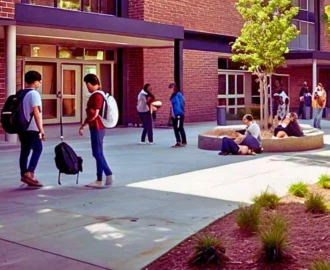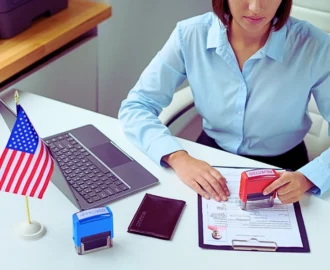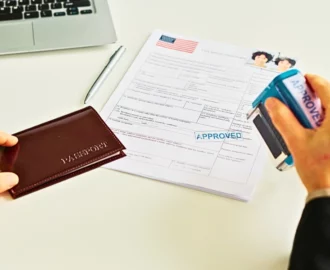If you would like to enter the U.S. legally via marriage, you may find yourself wondering how to get a marriage visa in the United States. In order to qualify, you need to meet the requirements for a marriage visa, such as proof of the validity of your marriage and a CR-1 or K-3 spousal visa petition, which could help you complete the application process.

For help with the immigration process and completing an application, reach out to the Chicago immigration attorneys at The Law Offices of Cheng, Cho, & Yee, PC, by calling 312-853-3088.
What Are the Eligibility Requirements to Obtain a Marriage Visa?
If your goal is to obtain a visa to enter the U.S. legally, one option available to you is a marriage visa. Marriage and fiancé visas are on the rise, with each year seeing an increase in approvals over the last.
Want to apply for a marriage visa? The following are the main requirements for petitioners:
You Must Be Legally Married to Your Sponsor
The primary requirement is for the petitioner to be lawfully married to the sponsor. Specifically, the marriage must have been legal in the location where the marriage took place. Additionally, you must prove that your marriage is “bona fide,” meaning the intention of your marriage is to become the other’s spouse to build a life together, indicating that you didn’t simply marry to obtain lawful permanent residence or citizenship in the U.S.
You Must Be Able to Support Your Sponsor
You will also need to show that you have the ability to financially support your spouse, along with other beneficiaries or children. If you are unable to do so on your own, you may be able to get a joint sponsor, which could include a friend or family member.
Your Sponsor Must Be Either a Lawful Permanent Resident (LPR) or a U.S. Citizen
To get a marriage visa, immigration laws establish that the sponsor must be either an American citizen or LPR. A citizen can either be a natural-born citizen or someone who has completed the naturalization process to gain citizenship. Meanwhile, an LPR will have a valid green card at the time of sponsoring the petitioner.
You and Your Spouse Must Have Legally Ended Previous Marriages
Immigration laws also make it clear that petitioners for marriage visas can’t apply if either they or their spouses are in other legal marriages. If you or your spouse have previous marriages, they must have ended through divorce, annulment, death, or other legally binding circumstances.
Your Sponsor Must Currently Reside in the U.S.
Even if your sponsor is a U.S. citizen or LPR, he or she must currently live in the country when sponsoring you or be able to prove that he or she will return to the U.S. with you.
You Must Pass Health Qualifications
One of the main reasons immigration applications are denied is that the petitioner either has a communicable illness or inadequate vaccination. To avoid denial on health grounds, you will need to complete a medical exam. However, you may have the option of applying for a waiver in certain situations, with the exception of those involving drug addiction or substance abuse issues.
You Must Have a Criminal History Devoid of Serious Crimes
While you may still be able to get a marriage visa in the U.S. if you have a criminal record, you may not qualify if you have a history of convictions for serious crimes. These crimes can include murder, trafficking, and other severe felonies. Also, you may not receive a green card if you appear to pose a serious security risk to the U.S. and its citizens.
Steps for Applying for a Marriage Visa
With a better idea of the requirements for a marriage visa, it’s important to know how to apply for a green card after marriage.
You can complete the application process by taking the following steps:
Complete and File All Necessary Forms
To start with, you must complete and submit all the required paperwork to U.S. Citizenship and Immigration Services (USCIS). For a marriage visa, you will need to file these forms:
- Form I-130, Petition for Alien Relatives
- Form I-130A, Supplemental Information for Spouse Beneficiary
- Form I-485, Application to Register Permanent Residence or Adjust Status
- Form I-864, Affidavit of Support
Depending on the case, you may also want to file Form I-765, Application for Employment Authorization, which can help individuals enter if they gained employment in the U.S. You also have the option of filing Form I-131, Application for Travel Document.
Gather All Relevant Supporting Documentation
In addition to the above forms, you will need to support your application with certain key documents.
These documents will include a passport-style photo of both you and your sponsor, a valid U.S. passport or another form of identification proving the sponsor’s citizenship, and proof of your current immigrant status.
You’ll also need proof of your marriage to show that it’s bona fide. These documents include a valid marriage certificate and documents showing the legal cessation of previous marriages, along with evidence of certain joint activities between you and your spouse.
Additional documents include proof of your ability to financially support your spouse and family, medical exam results, and a birth certificate.
Attend Your Interview
After submitting all forms and supporting documents, you will attend an interview with a USCIS official. USCIS will conduct this interview at an office close to your location for your convenience, and it will involve asking you certain questions about your purpose for obtaining your marriage visa. In the process, the immigration official will review your supporting documentation and determine whether you qualify for a marriage visa.
Both you and your spouse/sponsor will need to attend the interview.
Await Approval from USCIS
If you pass the interview, you will need to wait for USCIS to approve your marriage visa application. Upon receiving approval, you will be able to enter the country on a marriage visa with further instructions from USCIS.
If USCIS denies your application, you may be able to either appeal the decision with the help of a spouse visa immigration lawyer, or you could attempt to restart the application process with more supporting documentation at a later date. Ultimately, your ability to move forward with your application following a denial will depend on the reason for the denial.
What Is the Waiting Period for the Approval Process?
You’ll likely wonder, “How long does a marriage visa take, exactly?” Different U.S. visa categories will have different waiting periods.
Generally, if you apply for a CR1 visa, you will need to wait 11.4 to 15 months total to receive approval for your application, but the process could take as long as 29 to 40 months if your spouse is an LPR with a green card.
However, the timeline could vary depending on your case and the current backlog of marriage visas. You can see how long you need to wait by looking at the USCIS Case Status Checker online, which will indicate your case’s current status.
How an Immigration Lawyer Can Help You
If you need some help with the marriage visa process, you may benefit from hiring an immigration lawyer in Chicago for assistance.
Immigration lawyers can complete various tasks to help you navigate the visa application process and successfully receive your marriage visa.
First, an attorney could help you determine which forms to complete and assist with filing them. For example, you might have certain questions about what information to include in your forms, which an attorney can answer.
An attorney could also help you collect and organize all supporting documentation to further simplify the process and ensure you’re not missing any information. He or she could also confirm that all information is accurate and up to date, eliminating any errors that might otherwise compromise your case.
If USCIS denies your application, an attorney may be able to determine whether you’re able to appeal the denial with an immigration court. In doing so, your attorney may be able to successfully reverse the decision if the USCIS makes a mistake that leads to a denial, such as failing to properly assess all documentation or denying your application on false grounds.
Having this kind of representation behind you during the immigration process can make all the difference if you’re not sure how to proceed. Following immigration, your lawyer may also be able to assist with preventing removal and deportation, or he or she could help you sponsor another family member in a future immigration case.
If you would like the help of an experienced immigration attorney in Chicago, The Law Offices of Cheng, Cho, & Yee, PC, may be able to represent you during the visa process or for other immigration matters. Contact us today to speak with one of our lawyers about the options available to you.




